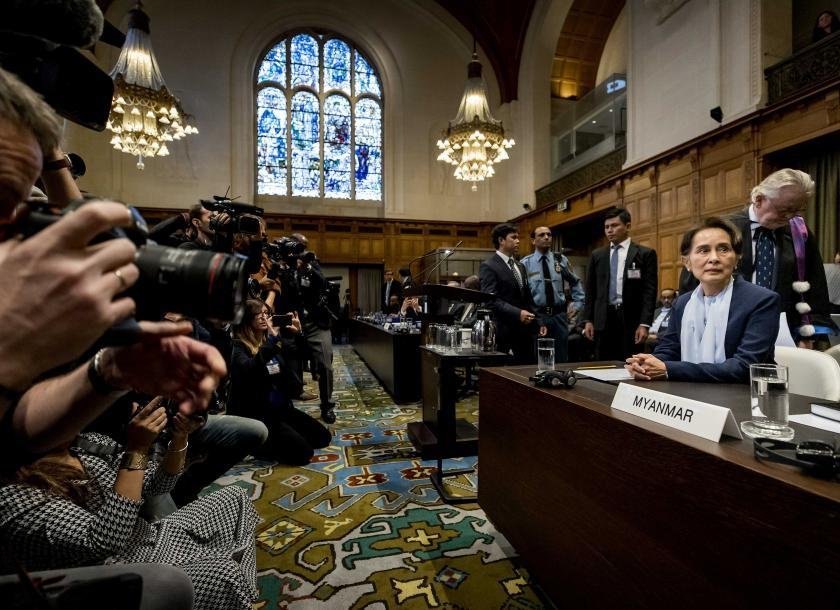Former special UN Rapporteur Yanghee Lee said Myanmar did not make any progress in improving the plight of the northern Rakhine Muslims.
“Sadly, no progress at all,” she said on May 22 in a webinar organised by the Global Justice Center, ahead of the May 23 deadline for Myanmar to submit a report on the International Court of Justice (ICJ) about measures that were taken to stop alleged genocide of northern Rakhine Muslims.
Lee only concluded her mandate as the Special Rapporteur two weeks ago.
Since the ICJ’s ruling on provisional measures in January, Myanmar has issued three presidential directives, including one to ensure officials “do not commit genocidal acts”, another one to prohibit the destruction and removal of evidence of genocide, and the other to prevent incitement and proliferation of hate speech.
But experts have argued these directives are neither meaningful nor practical to address the problem.
Although the directives appear to be the “the only substantive response from Myanmar since the January ICJ order”, they include no clear guidelines for implementation and monitoring, and do not touch on the key issues of structural discrimination to “meaningfully give effect to the order”, said Global Justice Center in a statement.
“Unfortunately, the response since then from Myanmar’s government has been deeply flawed at worst, and superficial at best,” said Akila Radhakrishnan, president of the centre.
To stop discrimination and persecution, Myanmar needs “legislation that incorporates the Genocide Convention into its domestic law,” said Lee.
She claimed that existing legislation is not only insufficient in holding those responsible for the crimes committed accountable, but the domestic legal system is far from independent.
The former rapporteur added discrimination is still embedded in many Myanmar laws.
She said an alternative is to implement the Kofi Annan mission recommendations, a roadmap for Rakhine that will allow refugees’ safe return.
However, the recommendations have yet to be implemented completely, even though State Counsellor Daw Aung San Suu Kyi has publicly endorsed and pledged to carry out all of the commission’s 88 recommendations in 2017.
Over 730,000 northern Rakhine Muslims have fled to Bangladesh since the Tatmadaw’s “clearance operations” in August 2017. Most of them now reside in the world’s largest refugee camp in squalid conditions in Cox’s Bazar.
The military clearance operation was triggered by simultaneous attacks launched by the Arakan Rohingya Salvation Army against 30 remote government outposts in northern Rakhine on August 25.
The attacks occurred two days after the Kofi Anan Commission submitted its report to the government that include recommendations on how to achieve sustainable peace and development in northern Rakhine.
Lee also denounced the continuing restrictions imposed by the government on humanitarian aid agencies in northern Rakhine as well as the shutdown of internet access in several townships in Rakhine and in Paletwa township in nearby Chin State. This month marks the 11th month of internet shutdown for four of the eight townships which are restricted in internet access.
The government maintained that restrictions on humanitarian organizations in Rakhine are necessary as some of the assistance intended to the people ended up in the hands of the Arakan Army, which has been fighting the government since November 2018 in Rakhine and Chin states.
In the case of the internet shutdown, the government said the move is to prevent the Arakan Army from using the internet to coordinate attacks against soldiers and even to detonate landmines.
The government said its programme to prevent COVID-19 in Rakhine is not hampered by the shutdown as the health workers can communicate through text messages and mobile phones. But the UN previously stated that internet restriction has seriously impeded its work and communication on the ground.
So far, there are only two cases of COVID-19 in Rakhine and all of the victims were returnees from Malaysia who were under quarantine, while two cases were also recorded in the refugee camp of Cox’s Bazar. Experts are worried about a massive outbreak, given the overcrowded situation in the settlement.
Over 140,000 civilians were displaced, more than 100 killed and hundreds more injured since the fighting between the military and the predominantly Buddhist Arakan Army (AA) erupted.
The pandemic has not stopped the ongoing conflict. Though the military declared a unilateral ceasefire recently, townships, where it engages with the AA, are exempted.
The AA is fighting for autonomy from the central government. mmtimes

